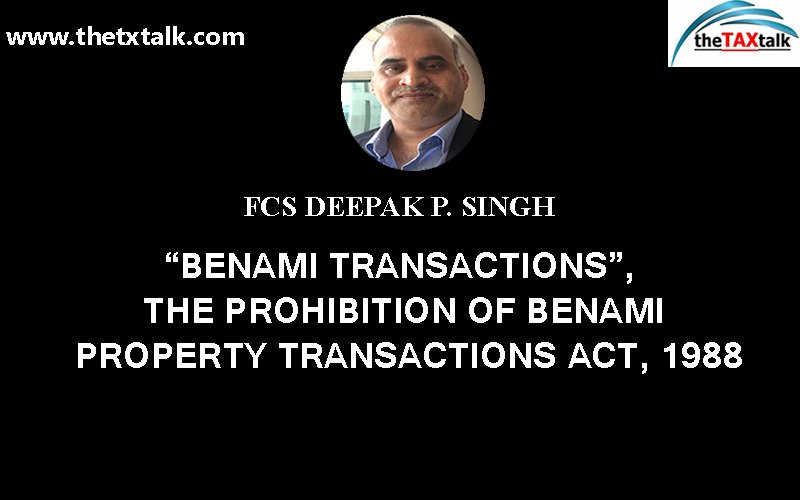![]()
“BENAMI TRANSACTIONS”, THE PROHIBITION OF BENAMI PROPERTY TRANSACTIONS ACT, 1988
Author
FCS Deepak Pratap Singh
Preamble; An Act to prohibit benami transactions and the right to recover property held benami and for matters connected therewith or incidental thereto.
“BENAMI” the word is combination of a Persian Words, as “be” means without and “nam” means name, i.e. “Benami” means “Without Name”. Benami, denotes any transaction made by a person without using his name on the name of other person.
Since prior to enactment of PBPT Act, 1988, the Benami Transactions are legally allowed and recognized by the Courts and name “Benami” generally not used in any statute.
As held in Anacapa Vs. Ramaswamy AIR 1925 Mad. 1005; – A “benami” transaction is one where a person “beneficial owner” buys property in the name of another “benzamide”, without indicating an intention to benefit the other.
57th Report of Law Commission: defines the “benami transaction” as follows;
Para 1.5 Meaning of Benami Transaction; – Purchase or holding of properties in the name of another is known as a “benami transaction”. This custom has been recognised by Indian Courts for a long time. Literally the word” benami” means,” Without Name”. The essential legal characteristic of these transactions is that there is no intention to benefit the person in whose name transactions is made. The name of that person popularly known as “benzamide”, as Privy Council pointed out is simply an “alias” for that person beneficially interested. The “benzamide” has the ostensible title to the property standing in his name; but the beneficial ownership of the property does not vest in him but in the name of real owner.
“BENAMIDAR” is a person, who has no beneficial interest in the property, though the property has been registered in his name. A “benamidar” is a person, whose name has been used as “alias” for the person, who has beneficial interest in the property.
Gur Narayan Vs. Shella Singh 1919(46)IA19:46 Cal, 566, 575 and Pitahaya Vs. Ragtime AIR 1929, Mad 268; it was held that the “benzamide” therefore has no beneficial interest in the property or business that stands in his name; he represents in fact the real owner and so far their relative legal position is concerned , he is mere trustee for beneficial owner.
The Benami Transactions Prohibition Act, 1988 was enacted by the Parliament 19th May, 1988, it repeals Sections 81,82 and 84 of Indian Trusts Act, 1882, Section 66 of the Carps, 1908 and Section 281 of Income Tax Act, 1961.
In initial stage there were various infirmities in the legislation and same have been shorted out by amendment in Act, 1988, through “BenamiTransactions (Prohibition) Amendment Act, 2016. The title of the Act, 1988 was change from “BenamiTransactions (Prohibition) Act, 1988” to “The Prohibition of Benami Property Transactions Act, 1988.
The Act, 1988 is not applicable to the State of Jammu and Kashmir.
Let’s us discuss “BENAMI TRANSACTIONS”;
Section 2(a) of the Act, 1988, define;“benami transaction”, to mean “any transaction in which property is transferred to one person for a consideration paid or provided by another person”.
The main ingredients of a “benami transaction” are;
-
Transfer of property for consideration; and
-
The consideration is provided not by the transferee but another person on behalf of transferee.
The Amended Act, 2016 has been charged definition of Clause 9 in Section 2 as follows;
Section 2(9)(A): Benami Transaction, transaction or arrangement, where consideration provided by person other than the transferee or the person, in whose name property is held.
Exceptions; following transaction would not be regarded as “benami transactions;
-
Karta or member of HUF holding HUF property if consideration for property provided or paid out of know sources of HUF;
-
Property hold by a person standing in fiduciary capacity;
-
Property held in the name of spouse or any child of an individual and consideration for property paid or provided out of known sources of individual;
-
Property held jointly in the names of an individual and his brother/sister/lineal ascendant/ linealdescendant, where consideration for property paid or provided out of known sources of individual;
- Genuine stamp duty paid Power of Attorney transactions referred to in Section 53A of Transfer of Property Act, where contract (agreement to sell) is registered and transferee has taken possession and paid consideration to transferor but property remain in transferors’ name.
Section 2(9)(B): Benami Transaction, transaction or arrangement in respect of property carried out in a fictitious name;
Section 2(9)(C): Benami Transaction, transaction or arrangement in respect of property where owners deny knowledge of ownership or not aware of ownership;
Section 2(9)(D): Benami Transaction,property transaction or arrangement in, where person providing consideration is not traceable;
Note: the exception referred in Section 2(9)(A) are not applicable in Section 2(9)(B) to (D) as referred above.
As mentioned above, there are four categories of “benami transactions”;
-
transaction or arrangement, where consideration provided by person other than the transferee or the person, in whose name property is held.
-
transaction or arrangement in respect of property carried out in a fictitious name;
-
transaction or arrangement in respect of property where owners denies knowledge of ownership or not aware of ownership;
-
property transaction or arrangement in, where person providing consideration is not traceable.
Note: (i) if any transaction dose not fall within the scope of any of these four sub-clauses, it is not a “benami transaction” and property involved is not a “benami property”.
(ii) “benzamide” may be any person-individual or HUF or Firm or Company or AOP or BOI or Artificial Juridical Person.
(iii) any property which is subject matter of any of four transaction is a “benami property”.
(iv) “beneficial owner” may be any person-individual or HUF or Firm or Company or AOP or BOI or Artificial Juridical Person.
(v) Either “beneficial owner” or “benamidar” may be fictitious or untraceable but not both.
Let’s us consider “TRANSACTION OR ARRANGEMENT”; is not defined under that Act, 1988. But a “Transaction or Arrangement “means exchange of goods or resources between at least two distinct parties.
R.Vs. Dairy Product Quota Tribunal for England and Wales exp. Lively [1988]27 e.g. 79. it was held that a verbalarrangement, which is not legally enforceable is capable of amounting a “transaction” or “arrangement”.
“Transfer”; – Section 2(29) define transfer in an inclusive definition;
Transfer includes;
-
Sale or
-
purchase or
-
any other form of transfer of right, title, possession or lien.
Let’s us consider an example: Suppose Mr. A an NRI, in America has transferred Rs. 1,.00 Cr from his NRO account to his brother, Mr. B. Now Mr. B. has invested the amount transferred in various shares of listed companies, FDRs and other investment instruments in his name, as a single owner in India, with an intention to return the gifted amount to Mr. A. This transaction is a “benami transaction”.
If Mr. B has invested amount received from his brother Mr. A in joint name of Mr. A and Mr. B, then this transaction falls in the exception category as mentioned above in Section 2(9)(A) of the Act, 1988.
Lets’ consider case of purchase of property;
-
A has purchased a property of Rs. 2.00 crores. He has paid Rs. 50.00 Lakhs through cheque and Rs. 1.50 Crore in Cash and Cash payment has not been declared in his ITR. In this case, since property is registered in his own name and not in the name of other persons or he is not holding property for the benefit of another person. He is the owner of the property, so in this case the above transaction is not a “benami transaction” as funding from known source will arise only in case, when property has been registered in the name of spouse/ children or where it is registered in the name of brother/sister/linealascendant/ lineal descendant. But this is the case of Tax Evasion or Stamp Duty.
-
A has purchased a property in India for Rs. 4.00 Crore in India. The payment of Rs. 2.00 Crores was made in Cash and Rs. 2.00 has been paid through banking channel. The payment out of Rs. 2.00 Crores, Mr. A has paid Rs. 1.00 Crore through his bank and Rs. 1.00 Crore has been arranged by builders by taking entries from various persons in the account of Mr. A. Even though the name of above persons has been shown in the registration documents but this transaction of “benami transaction”, since Rs. 1.00 Crore has been paid from Unknown sources/ bank accounts.


